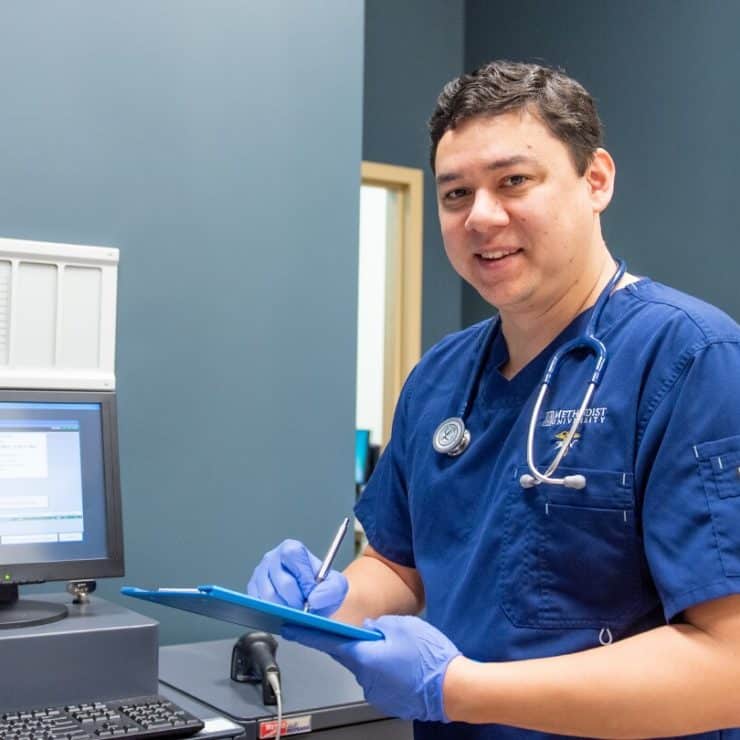
Nursing
Welcome to the Methodist University Bachelor of Science in Nursing (BSN) Program web page! The Nursing faculty, staff, and I are excited that you are considering or have chosen Methodist to begin or advance your career in the field of Nursing!

There are two pathways to the Bachelor of Science in Nursing (BSN) degree offered at Methodist; the Traditional BSN pre-licensure program and the fully online RN-to-BSN Completion program. Additionally, we offer an online Graduate Certificate in Nursing Education (CNE), an online Master of Science in Nursing (MSN) degree in Administrative Leadership, and an online Doctor of Nursing Practice (DNP) in Executive Leadership. This landing page is devoted to sharing information about the traditional BSN pre-licensure program which is an on-campus, face-to-face program.
Students in the traditional BSN pre-licensure program will graduate with competencies in providing patient-centered care, working within interdisciplinary teams, employing evidence-based practice, applying quality improvement, utilizing informatics, and functioning in an environment of integrated processes within a global community. Graduates are eligible to take the National Council Licensure Examination-Registered Nurse (NCLEX-RN) to become licensed as a registered nurse.
Please feel free to explore our web page and discover more about what Methodist University Nursing can help you achieve. We look forward to having you as a student!
Shannon Matthews, DNP, RN, CHSE, CNE
Director, Nursing Program
Why Choose MU Nursing?
From state-of-the-art facilities to the opportunities MU affords both undergraduate and graduate students, find out what distinguishes MU Nursing.
Common Career Paths
A bachelor’s degree in nursing (BSN) opens several doors from a career perspective for registered nurses. Career opportunities can be found in a wide variety of areas including hospitals, physician offices, home health care services, nursing homes, surgical centers, and dialysis centers. With advanced education and training, other nursing positions include nurse anesthetist, nurse midwife, nurse practitioner, and more.
Common Salary Ranges for Graduates
According to Salary.com, the average New Graduate Registered Nurse salary in North Carolina is $65,931 as of July 2023, but the range typically falls between $59,143 and $75,371. Salary ranges can vary widely depending on the city and many other important factors, including education, certifications, additional skills, the number of years you have spent in your profession.
Average Tuition Cost
The average cost for an incoming residential freshman to attend MU is less than $18,000 – similar to the cost of attending one of the big-box public schools, but with the enhanced value of a highly-regarded private school with a 12:1 student-to-faculty ratio.
While tuition varies, depending on a student’s financial aid package, it’s important to know that the average financial award for an incoming residential freshman at MU is more than $34,000.
See our Nursing Program Tuition & Fees page for more information.
Financial Aid & Scholarships
More than 97% of MU students receive some form of financial aid, with the University offering more than $24 million annually to students for scholarships. If a student is active military, family of active military, or a veteran, they may also qualify for MU’s military education benefits.
Contact
Jennifer Caviness, B.S.

MU Nursing Program on Facebook
Frequently Asked Questions
Yes. The science pre-requisites, Anatomy & Physiology I and II, and Microbiology have a five-year limit.
Students may be considered for conditional acceptance to the Nursing Program with General Education core semester hours still outstanding. No more than three General Education core classes outstanding is recommended. All remaining General Education core requirements must be completed by the end of the summer semester prior to entering the senior year of nursing courses.
No. A CNA license is not required to apply or be admitted to MU’s nursing program.
The Bachelor of Science in Nursing degree is designed to take four years to complete. The first 2 years are typically spent completing general education courses and nursing pre-requisites with the remaining 2 years in the Nursing Program.
All official transcripts are reviewed by the Registrar’s office for transfer credit as part of the Admissions process to the University.
Applications are open from November 1 through January 31 of each year.
The MU Nursing Program accepts a new cohort of students only in the fall of each year.
Nursing courses taken at another college or university may be reviewed on an individual basis. Acceptance is determined by the Director of the Nursing Program.
Contact the Nursing Program Admissions Coordinator at 910.630.7578 or jcaviness@methodist.edu to schedule an appointment.
